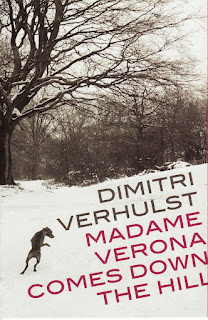Madame Verona Comes Down The Hill - Dimitri Verhulst
Verhulst considers Madame Verona's condition at this delicate stage in her life principally through the setting, specifically in the little village of Oucwègne, a village build on three hills. It's to this remote little place of no more than forty people that once had a cow for a mayor that she, a piano teacher, had come to live with her husband, a renowned composer. Her husband now dead, her regular climb down the hill to the village comes to express something else – the realisation being that, in her old age, the day will come when she will not make it back up again.
Adopting the tone of a fable, the novella considers the position of Madame Verona from a number of viewpoints - her own attempt to define her condition and also how she is viewed by the villagers of Oucwègne, but also through flashbacks that contrast the married woman with the widow, the younger woman with the older, and of course through the village itself which is also slowly dying in its distance from the modern world.
As well as finding much that is evocative in the setting and in the woods that border her house, Verhulst makes wonderful use of language and poetic imagery, considering for example the use a tree can be put to - a living thing reduced to wood that can be made into a coffin, or even a cello - and that the space the felled tree leaves behind will be occupied by something or someone. "It's like that for trees, it's like that for people". Gorgeously written in this respect, the novella finds a way to express the nature of life, of change and of the inevitable progression of time, seeking to find meaning in it all, or at least something of beauty.




Comments
Post a Comment